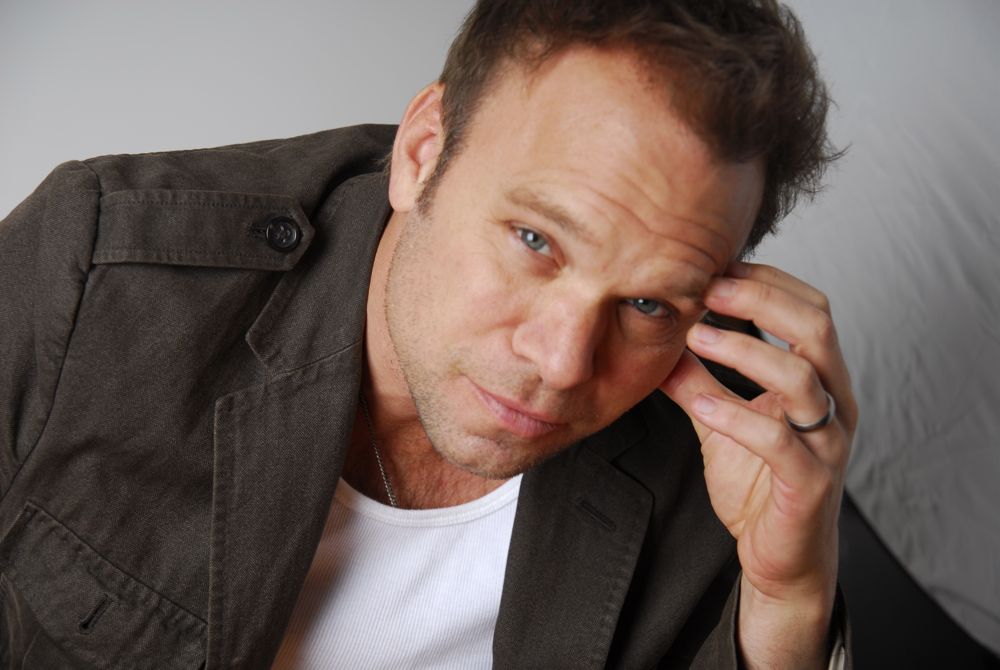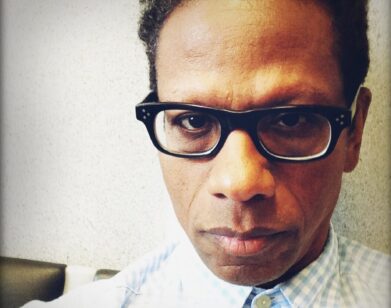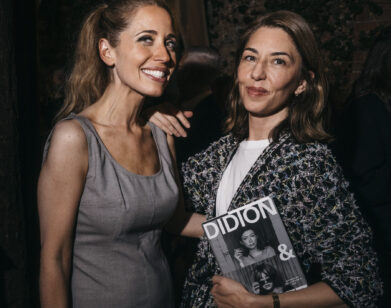Norbert Leo Butz and the Root of Evil

ABOVE: NORBERT LEO BUTZ. PHOTO COURTESY OF TOM SINGER.
You may arrive at Jack O’Brien’s new production of Theresa Rebeck’s Dead Accounts curious about how Katie Holmes will fare on Broadway, but you’ll leave only thinking about Norbert Leo Butz.
The play tells the story of a large, Midwestern, Catholic family; Butz and Holmes play Jack and Lorna, the youngest of six children. Judy Greer, Josh Hamilton, and Jayne Houdyshell round out the cast as Jack’s wife, high-school best friend, and mother, respectively. Both Lorna and Jack have reached dead ends in their lives and returned home, but they handle it very differently. While Lorna whines and occasionally screams, Jack relishes in every moment, immortalizing it with a monologue. For Lorna, everything is downtrodden, pointless; for Jack, everything is high-stakes: one minute he is marveling over ice cream and the next despairing over the moral code of New York (it is not, it seems, the same as the moral code of the Midwest). As the prodigious and prodigal Jack, the Tony-award winning Butz quickly takes over the show, but that is exactly what his character would do.
We recently spoke with Butz about his own Catholic and Midwestern upbringing, what his character was like as a teenager, and the dangers of getting swept up by New York.
EMMA BROWN: Is it just a coincidence that you and Katie Holmes are both from big Catholic families in the Midwest?
NORBERT LEO BUTZ: [laughs] They say there are no accidents in art. But yeah, I don’t know if it’s a coincidence, but it sure is helpful. It’s definitely a shorthand of behavior and sensibility, really, that we share with the characters in the play.
BROWN: I didn’t know that there was a significant Catholic culture in the Midwest.
BUTZ: I guess it sort of makes sense. I mean, I’m talking sort of recklessly about things I don’t really know anything about—sociology or anything like that—but I’m from St. Louis, which is a very, very Catholic city. [It] was founded by French explorers, and they would have brought Catholicism to the city. To this day—even though Catholic culture is becoming lost—I do think in those more traditional households you find multiple children. It was not uncommon in my neighborhood. I’m one of 11, and we were not the largest family.
Like in the play, all of my brothers were altar boys and none of my sisters were. I’ll have to ask them if they harbored a resentment about that. It was just something everyone did. You were expected to serve on the altar. In some ways, I look back and it was kind of my first introduction to theater. It’s very theatrical, all that ritual. I always felt like it was a big stage. I actually loved it.
BROWN: What was dinner at your house like?
BUTZ: [laughs] It could be chaotic. You had to be on your toes in our house. You had to have quick arms, and quick reflexes to get the last biscuit, or the last glass of milk. You had to fight a little bit for your food. [laughs] And my dad would always be grabbing at our plates, too, so you had to learn to—
BROWN: Sit far away from him?
BUTZ: [laughs] Sit far away from Dad. Exactly.
BROWN: What was your first impression of your character, Jack?
BUTZ: I thought he was really funny. I thought he was a bit of a mystery. One of the cool things about the play is that you don’t actually know what’s motivating the guy for a long time. [Theresa]’s really good—almost like a mystery writer—at manipulating the audience into hanging on for the next bit of plot. And she doesn’t end it until the very, very end. I love the way all the characters speak in the play. It was a speech that I really recognized, this “say what you mean, mean what you say.” It’s actually difficult to memorize, because there are a lot of run-on sentences, a lot of ellipses, a lot of broken-up lines—and that’s actually the way we speak. We stammer, and start again, and change directions, and we go on tangents.
BROWN: Have you ever forgotten your lines?
BUTZ: Now that it’s really in my body, it’s just so much fun to speak, but the other night I went up really bad. I went up so bad that I didn’t know who or where I was for a solid 30 seconds on stage. Katie said she didn’t even notice. I think she’s lying. She had to have noticed when I turned white and started to flop sweat in front of 800 people. But that’s the only time. Hopefully I got it out of my system.
BROWN: Where do you think Jack falls in the line of siblings? I know he’s older than Katie’s character Lorna.
BUTZ: Well, we take a few liberties with it. I’m almost a solid 10 years older than Katie, but they’re probably closer in age in the play than we are in real life. We try to trick the audience. I’m actually playing the brother closest to her in age, we were contemporaries, maybe two years apart, and good, good friends growing up. We were cohorts, buddies. I definitely understand that, I was definitely that way with my brothers who are close in age to me in my own family.
BROWN: Oh really? I was the youngest, and my oldest sibling and I would gang up on the middle one.
BUTZ: Yeah, you sort of form alliances. And then they can switch sometimes. It’s really interesting, family dynamics. That’s what the play is about—it’s a play of relationships and how they play out in this critical turn in this man’s life.
BROWN: What do you think Jack was like as a teenager? Because we meet him at such a high-stakes point in his life.
BUTZ: I love that question. They talk about him a lot in the play as being really hypertense, very quick-witted, very smart. He probably got really good grades without having to try too hard, could talk his way out of different things in classes. He has a tendency towards, maybe, substances that are illegal. [laughs] I imagine him as one of those guys that could just hang with anybody. That’s Jack’s real gift, he can read people very quickly and he can surmise how to behave towards them. He probably had some stoner friends, some jock friends, some smart friends. I can’t help but think that he was well liked, because he’s also described as being a real force of energy, sort of a life-of-the-party type of a guy. I imagine he had a good time. [laughs]
BROWN: Obviously, the part requires a lot of energy. There must be some nights when you just don’t feel like performing…
BUTZ: I’m not there yet. That definitely comes into a run. We’re going to do this play for about four months, which is not a very long run. I’ve done some Broadway, especially musicals, that have run for a year, or a year and a half. I did Rent for almost two years. Those are very, very difficult. There’s something about the repetition that can become grinding after a while. I know a lot of people say this, but it really does help to imagine that audience as it’s own individual audience, filled with people who have worked really hard to be there, who spent a lot of money to be there. I like to even get specific sometimes: “There’s a couple out there, who had a baby a year ago, and this is literally the first date that they have had in a year. Let’s not make it a sucky date. Let’s give them a great night.” If you individualize an audience, it helps up the stakes of your responsibility to that audience.
BROWN: I know that in the preview stage you still rehearse during the day. Are you still changing the play from night to night?
BUTZ: Right now, the show is pretty solid. Because this play had an out-of-town production in Ohio last year at a local theater, it was in pretty good shape. I’ve done some plays, or musicals, where there are extensive rewrites all the way through. Literally up to opening night—brand new scenes, brand new songs—[and] that’s very, very stressful. This has remained pretty much intact. We’ve worked with rewriting the very end, the last couple of moments. That continues to shift a little bit, just by a few words. It’s important that we get the right ending, the right coda for the play.
Having said that, because there’s only five of us, and it’s one set, and it’s a very naturalistic play, we can change from performance to performance. You’re saying the same words, but you really can take it lots of different ways. Certain nights, you feel like doing a line seated. The next night, maybe you want to stand and change where you are. We have the freedom to do that with this play.
BROWN: Do you ever mess with the other actors?
BUTZ: Do I mess with other actors? [laughs] Only in an appropriate way. It’s good to mess with other actors, in character—you really stand your ground, in terms of what you’re fighting for as a character—and try to throw them off what they want. But it’s really never good to intentionally try to screw up the other actor by playing tricks or making them laugh. It can be fun, but it’s only fun for you. It’s never fun for the audience. They don’t know it’s happening, but somewhere, they know. [laughs]
BROWN: You mentioned that having Katie in the cast really helped the show get to Broadway. I was talking to another actor who was telling me how much review can cripple a performance when the actors aren’t so well known; has that ever happened to you?
BUTZ: Oh yeah. I guess this is my 10th Broadway play, and several of them we’ve worked very, very hard on and a review came out, and then we were done. We closed immediately. It’s a terrible reality of our business. It’s very different from other forms, it’s very different from movies or TV. For the theater, it’s just The New York Times—it’s a one-newspaper kind of a deal—they wield so much power over whether something is seen or not seen. In TV and films, you have so much more: you have online critics, you have critics on both coasts, you have Variety and you have Rolling Stone. There are some shows, definitely, that can survive a bad review from The New York Times. I was in the original cast of Wicked, and that got a bad review in The New York Times, and it’s the most successful thing that’s ever been put onstage. But especially for a play, that doesn’t have immediate commercial appeal, it can be difficult.
BROWN: Jack talks about how we teach our children to have certain values—to share and trust—but if they exhibit these same values as an adult, they are considered naïve. When do you think that switch happens?
BUTZ: I don’t know if Jesus said it in the Bible, but someone said that “the love of money is the root of all evil,” and I do think there’s a correlation between the ambition that a lot of people have, in terms of financial remuneration, and the loss of core values. I feel like that’s been true for me; when a lot of money is laid on the table, it can be very, very difficult to remain true, not just to yourself, but to your belief system. That’s what happens to this guy; he has a very ambitious spirit and a huge intellect. People like that gravitate towards bigger markets—New York, LA, London—a place where those ambitions can be realized. This guy goes to work, and he meets this woman, and her father is a hugely powerful executive in the banking world. He goes to work in this milieu and does incredibly well for himself, and earning money starts to dictate his self-worth. That’s really when I think your moral compass can get really skewed. At least, I think that’s what the play is trying to say.
DEAD ACCOUNTS IS NOW AT THE MUSIC BOX THEATER IN NEW YORK. FOR TICKETS, PLEASE VISIT THE DEAD ACCOUNTS WEBSITE.






